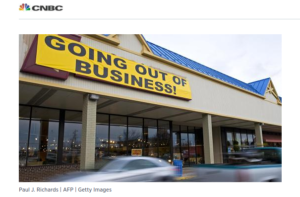 CNBC published an article last week: “The Amazon effect could potentially leave all Americans neighborless.”
CNBC published an article last week: “The Amazon effect could potentially leave all Americans neighborless.”
The author continues the long-lived and broadly-shared concern that online purchasing and social media are gutting traditional American commerce and interpersonal relationships, leaving us socially isolated amidst a ghost town of dead, bankrupted local businesses. It does sound ominous on the surface. What’s to be done with all of the empty malls and store fronts? What replaces those lost jobs? How do we stay connected to live human beings when we don’t get to see them as our sales people, cashiers and fellow neighbors that we bump into at the hardware store down the street?
The online trends are definitely disruptive. In my opinion, those disruptions are cumulatively positive for economy and quality of life. As consumer goods are supplied at lower costs, with lower overhead and greater efficiency, we are generally better off as a society – although there will be individuals and groups who are forced to adapt to the loss of their less efficient or demanded jobs and business models. These trends are deflationary – driving down prices generally (of goods and commercial real estate), which makes more available to those who could not have earlier afforded as much. That increases quality of life.
While many worry that we will become inseparable from a virtual world, stuck in our electronic devices, divorced from reality and personal interaction, I think we may have reached peak social media tolerance, or are near. People tend to be looking for ways to engage socially – some of which are facilitated and vastly expanded via internet tools. These connections are arguably superior to bumping into Bob and Susie at the hardware store, as we all search among a limited selection of goods priced significantly higher than what Amazon or Costco.com or Facebook Neighborhood Market offers.
As a social example, our local brewhouses in St Louis, are at or approach standing room only on busier evenings – filled with hipsters and professionals and families with children. Sociality proceeds, albeit somewhat differently than in decades past,… which was different from centuries past before telephone or telegram or postal services or a written language. I wonder if people in the early 1900s fretted that visits to friends and family would be curtailed because one now merely needed to pick up the phone to stay in touch.
I also think that it must have been a crisis for candle makers in the age of rising gas and electric lighting as they dealt with the unemployment in those increasingly irrelevant jobs. How difficult must have been the transition for the Resistant, the Entrenched, the Candle Makers’ Union – who surely fought tooth and nail against the perceived destruction of the lighting economy.
Technology is knowledge applied. Adaptation is perhaps a major key and joy to Life. I can get pessimistic about a lot of things (never-ending global warfare in the pursuit of Power and Other People’s Resources, suffocating and failed government programs and interventions, the Failed Drug War that has killed and destroyed more people than the drugs themselves ever could, etc.), but today’s and tomorrow’s internet connections, communications and commerce? These actually give me hope for humanity’s progress.
